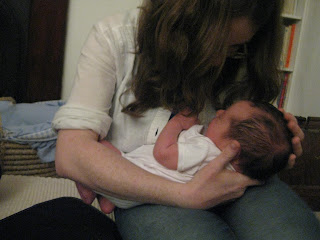Neoliberalism, feminism & the family.. we can do better than this
In response to Tracy Cassels, PhD’s article How Liberal Feminism and Patriarchy Work
Together to Create the Detached Mother http://evolutionaryparenting.com/liberal-feminism-patriarchy-detached-mother/
At first glance, this looked like an unusual and exciting
article - one which might possibly raise some interesting questions about the
role of “detachment” in our social and relations, and reassemble a
family-centric and feminist reading of the concept.
I was disappointed.
There's not even a passing mention of patriarchy and how it interacts with parenting. Instead, after choosing a incongruous title, Cassel appears to have switched her focus to economic liberalism - which at one point she substitutes with the term "neoliberalism". This is without any attempt to explore the (very interesting) relationship between patriarchy and neoliberal economics.
Cassel’s argument, in short, appears to be that attachment
parenting (i.e. making sure you are physically present and in close contact
with your young child whenever they need you) is a “natural” relationship that is
being eroded by (neo) liberal economics.
The narrative is familiar to anyone who has read Germaine
Greer and/or lots of today’s hottest parenting bloggers, most of whom also simplify
and disassociate what Greer says from its social, material and political
context.
Instead of delving into social and economic relations and its impact on parenting and the family in general, as Greer does, Cassel
stays put and assumes it suffices to define neoliberal economics as society’s preoccupation
with material productivity and wealth. The same could be said of any
materialist economic system, including those that are avowedly illiberal.
Cassel then counters the supposedly erroneous priorities she
has witnessed by citing psychological studies showing that “money doesn’t make
us happier” (by us, read the
well-fed, well-housed, homeowners who have a career waiting for them if they
want one). Seems strange given that Cassel is so insistent about her phD
status, and insists on referring to all the friends whose work she cites with the obligatory title Dr. But it becomes clearer, as she goes on about the irrelevance of "day time productivity", that she doesn't really consider the title to just wash off and become irrelevant once one becomes a parent.
Cassel seems an unlikely candidate to call the concept of economic productivity into question, until you realise that she’s writing for the people who already have their doctorates and/or their passport into a state of social and economic security (either through educational or professional achievement, or, of course, those age-old elephants in the room - inheritance and marriage). She's basically just telling her readers they should chill out and embrace the next, nicely planned and on-schedule stage of their lives now they’ve sorted out their bread and butter. The presence of a benevolent and high earning husband always lurks in the shadows of these arguments, despite their self-avowed “feminist” angle.
Cassel seems an unlikely candidate to call the concept of economic productivity into question, until you realise that she’s writing for the people who already have their doctorates and/or their passport into a state of social and economic security (either through educational or professional achievement, or, of course, those age-old elephants in the room - inheritance and marriage). She's basically just telling her readers they should chill out and embrace the next, nicely planned and on-schedule stage of their lives now they’ve sorted out their bread and butter. The presence of a benevolent and high earning husband always lurks in the shadows of these arguments, despite their self-avowed “feminist” angle.
As a Brit, Cassel’s opinions and those her contemporaries sound
even more short-sighted bearing in mind that that they live in the US, a
country in which there is practically no social safety net, and in which
statuary maternity leave is just 12 WEEKS LONG, and completely UNPAID.
Telling people that they shouldn’t value “material productivity”, but instead focus on their children’s physical and psychological needs by always being with them is all well and good, but what about food? Instead of seriously addressing this, Cassel cites the example of a “traditional society” (which she embarrassingly substitutes for "tribe" later on in the sentence). As images of Pocahontas rush into our minds, Cassel tells us women would “forage” with their children present in such a society. By now it's clear that whether or not this is a realistic solution to making sure we can pay the bills is not relevant. She’s not speaking to people who worry about such things. Thus her evocation of "traditional" is completely pointless - and only serves in a Garden of Eden-like sense to bolster the supposedly universal validity of her nevertheless culturally specific arguments.
Telling people that they shouldn’t value “material productivity”, but instead focus on their children’s physical and psychological needs by always being with them is all well and good, but what about food? Instead of seriously addressing this, Cassel cites the example of a “traditional society” (which she embarrassingly substitutes for "tribe" later on in the sentence). As images of Pocahontas rush into our minds, Cassel tells us women would “forage” with their children present in such a society. By now it's clear that whether or not this is a realistic solution to making sure we can pay the bills is not relevant. She’s not speaking to people who worry about such things. Thus her evocation of "traditional" is completely pointless - and only serves in a Garden of Eden-like sense to bolster the supposedly universal validity of her nevertheless culturally specific arguments.
Cassel is attempting to advocate that as parents, women (yes, there’s very little focus on the fact that men also sometimes look after the kids) elevate themselves above material conditions and just be spiritually “there” for their kids.
Despite this, she can’t resist calling childcare workers “poorly-paid strangers”, as if their level of pay somehow defines their ability to do their jobs. At the end her article, Cassel gives various recommendations to employers and local legislators – including extending maternity leave (unpaid, obviously, this is the US) to 3 years, and family members giving an allowance to each other in return for childcare. Unsurprisingly, no recommendations are made regarding pay for nursery or childcare workers.
I mean, we’re not actually taking on neoliberalism, are we?


Comments
Post a Comment